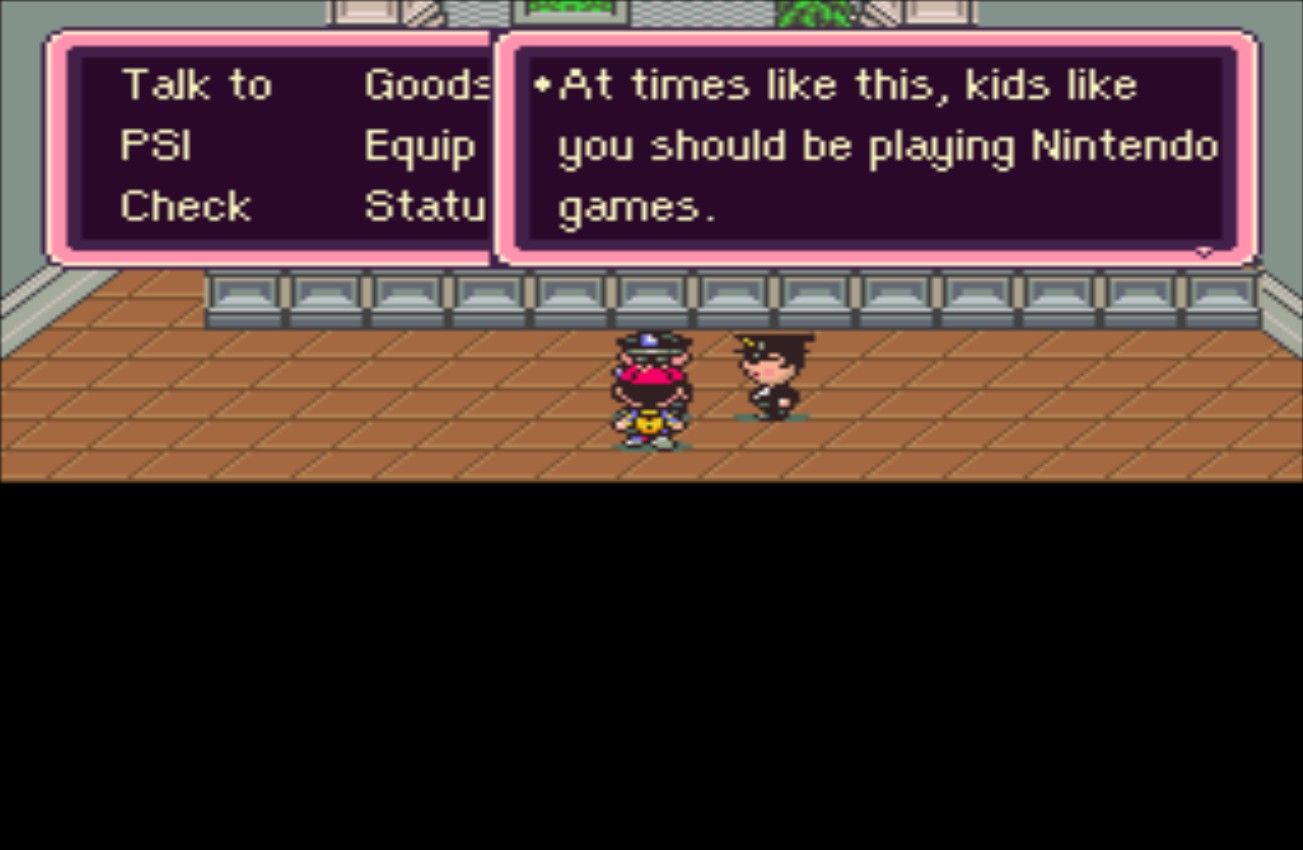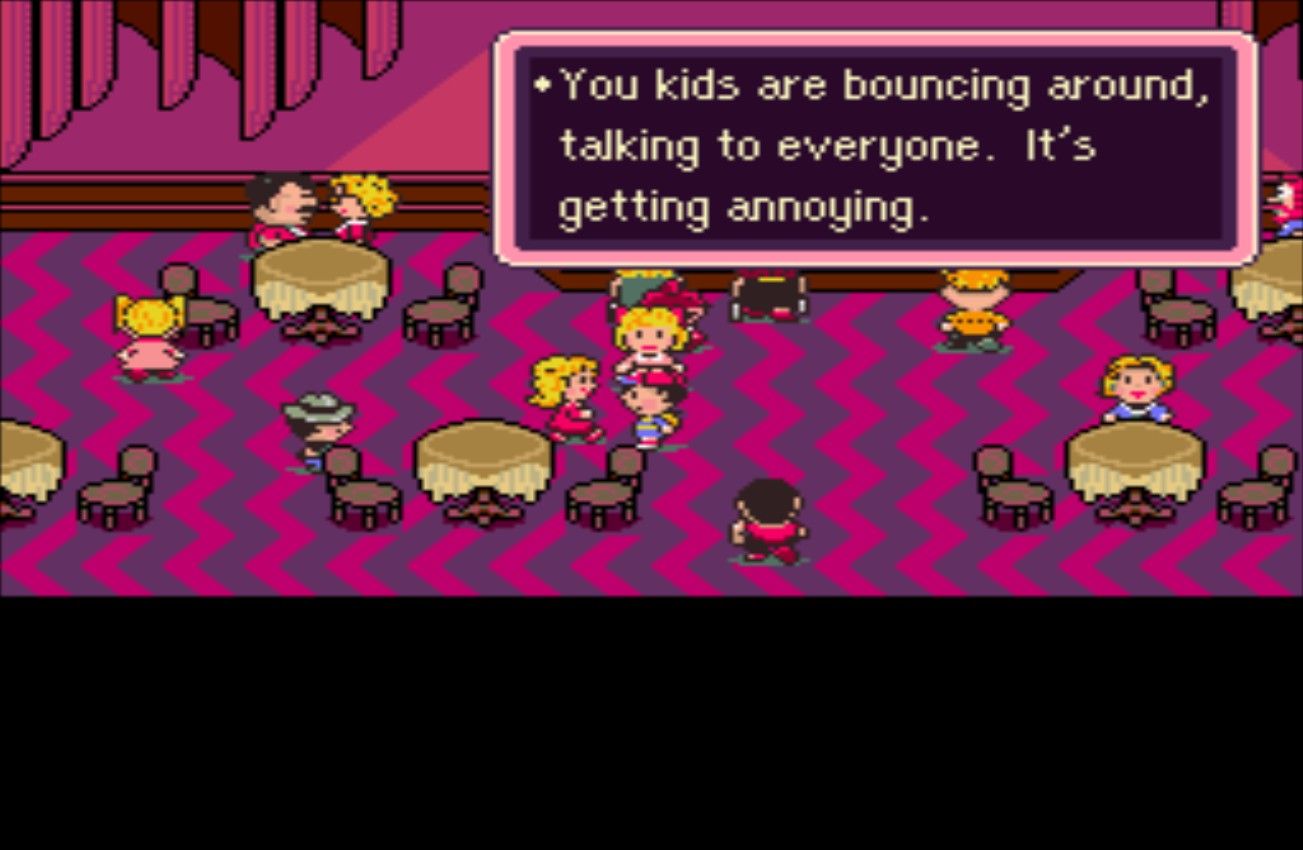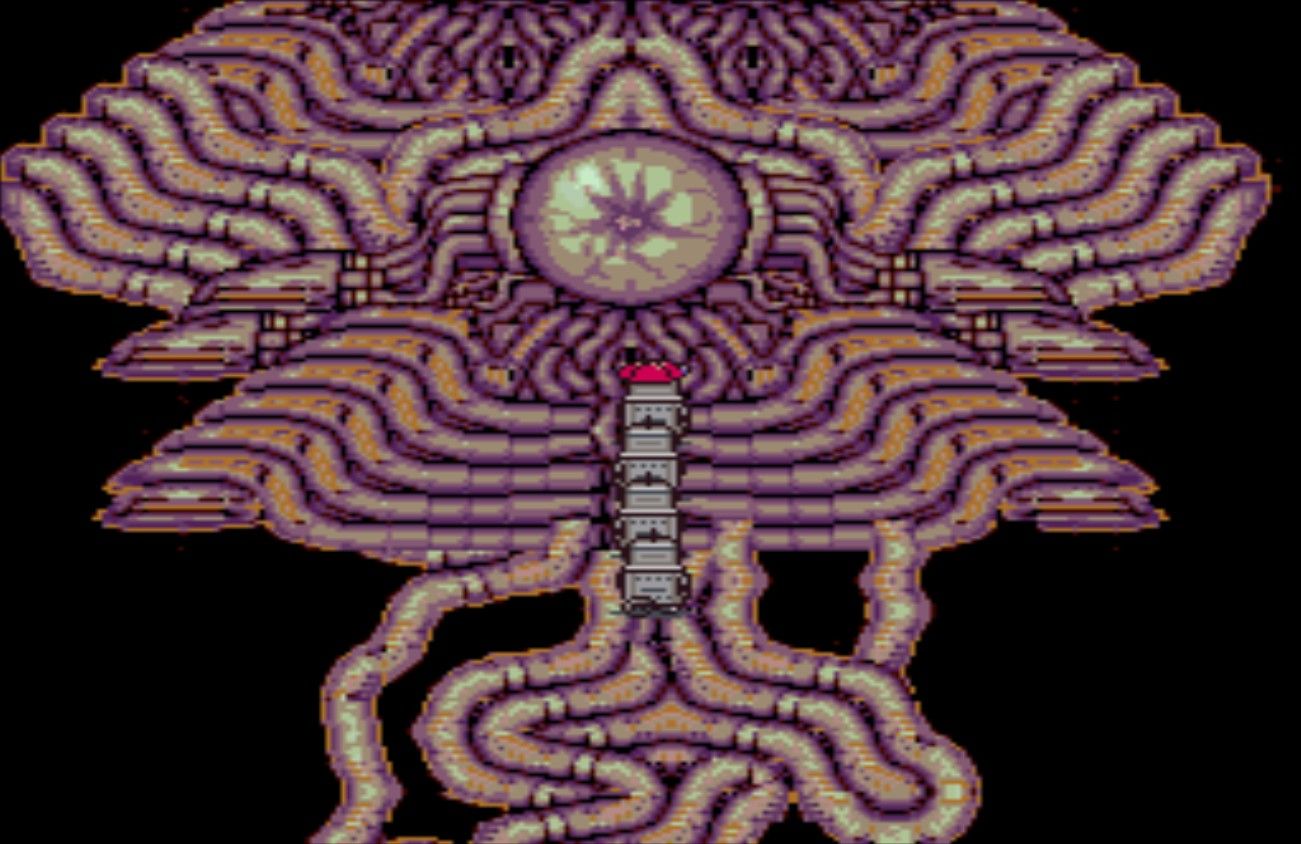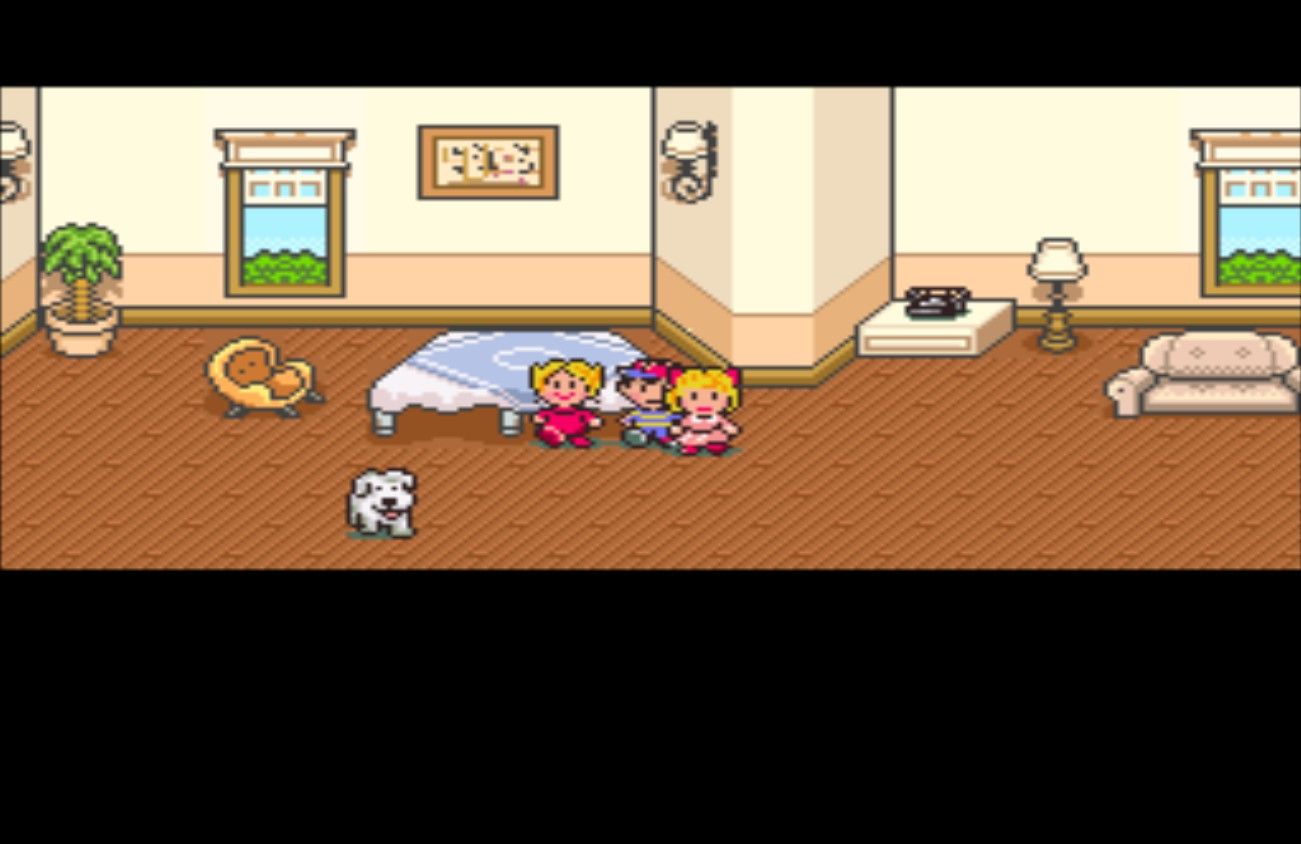Game Review: Earthbound
After I beat Morrowind, I polled my friends about which game I should play next between Earthbound and Planescape: Torment. Counting people who voted multiple times as legitimate contributors, Earthbound won by a million to one. That was a pretty strong endorsement, so as much as I kind of wanted to ignore them and play Planescape: Torment, I figured I would bow to the wisdom of the mob. So I load up the game, go through the intro, and then immediately set to my main task during the game--cruelty to animals.

Gameplay in a nutshell!
And that set the tone right from the beginning. I've played plenty of JRPGs and I know all the tropes and how they're supposed to go, and in the beginning Earthbound seems to fit into most of them. You have your tons of battles--though not random, since you can see the enemies on the overworld map--you have your chosen one with a glorious destiny, you have your quest that you have to leave home to accomplish, you have your vendors that sell equipment so you can kill bigger monsters who let you buy better equipment, the works.
But Ness's home is never destroyed, and in fact, he can return any time he wants and his mother will be waiting with a steaming plate of [INSERT FAVORITE THING] for him and send him off to bed. The equipment you get is slingshots and baseball bats and laser guns and frying pans. You grind monsters, but the actual money comes as allowance from Ness's absentee father--and let me tell you that it galled me a bit that by the end of the game, Ness had more money in his checking account than softlykarou and I have in our retirement accounts. And the great quest to save the world is delivered by a Space Bee From The Future who is promptly swatted by Pokey's mother before it can do more than hint about Ness's glorious destiny. Then the plot stops mattering.

Laying down the law.
Okay, that's not entirely true. The reason Ness and his friends wander around the world is that they're looking for the eight Your Sanctuary locations that will give him the melody he needs to defeat Gigyas...but during most of the game none of that matters at all. Gigyas isn't an active presence during the game and the only way you even remember he exists after Space Bee tells you the plot is that some of the enemies occasionally reference it. The closest thing to a recurring enemy Earthbound has is Pokey, who goes from the kid next door that Ness plays with to the Happy-Happy right-hand man to Fourside's evil mastermind to a time-traveling Master of All That Is Evil, and none of that is ever explained.
"None of that is explained" is really a theme in Earthbound. What is the Apple of Enlightenment? Why are the Your Sanctuaries the way they are? What does the Mani Mani Statue have to do with the plot? It seems to be a focus for Gigyas's power, but why, and why does it show up in Magicant as Ness's nightmare? Why does Pokey want to destroy the universe just to get back at Ness? It's true that few adults are as pointless malicious or thoughtlessly cruel as children are, but Pokey goes from asking Ness to help find his brother to piloting a killer spider robot while channeling the incomprehensible power of Gigyas in the last battle with no real way to connect the dots. It's destiny, I guess. That's what Space Bee said, at least.
As a quick aside, through the magic of save states I found that the mechanics of the game actually support the theme of destiny because they're deterministic. When I'd reload a save state, if I did the same things in the battle, then the same outcome would occur. If I told everyone to attack and then the enemy got a crit and one-shot Paula, if I reloaded my save state and told everyone to attack in the ensuing battle, then the enemy would crit and one-shot Paula every time. Only if I changed my actions using my knowledge of the future would things play out differently. At first I found this a bit annoying, but I quickly came to appreciate it as an unintended bit of gameplay and story convergence.
Anyway, since the major plot doesn't matter, it's the small things that you focus on.

We're RPG protagonists, lady. Just doing our jobs.
Saving a town from a Zombie Apocalypse. Helping a bunch of cute little green guys learn to overcome their shyness. Paying off the Runaway Five's debt--twice--so they can continue their touring. Beating up aliens who have been abducting people. Saving cute little Mr. Saturns who have been kidnapped by a sentient pile of barf. Getting a man's wife to leave the pretentious philosophy club she's part of so you can eat some magic cake. I actually found it really affecting, because it's a lot like life. Going on grand quests against cosmic evil has essentially no relevance to me, especially since if I tried to murder stray dogs for money I'd end up in jail, but trying to get a spot in a great local restaurant? Seeing a band I love? Teaching people to overcome their shyness? Hell, I could use a JRPG protagonist to show up and help me with that last one.
And then at the end, after traveling through the world and helping all the people you meet, you fight Gigyas.

Iä! Iä!
Gigyas isn't a character, and the fight isn't a battle. Through most of the game you've had no idea what Gigyas really is or what it wants, and by the time you get there, Gigyas's selfhood has dissolved under the influence of its incredibly psychic power--or at least that's what Pokey tells you. So the fight starts against Pokey with Gigyas in an odd apple-shaped ball to Gigyas being unleashed, and then...well, it's chaos. It's all discordant jangling static through the speakers and twisting screaming faces in the background and and Gigyas babbling over and over with quotes like "I feel g...o...o...d..." and "It hurts" andNess! Ness! Ness! Ness! Ness! Ness! Ness! Ness! Ness! Ness! Ness! Ness! Ness! Ness! Ness! Ness! Ness! Ness! Ness! Ness! Ness! Ness! Ness! Ness! Ness! Ness! Ness! Ness! Ness! Ness! Ness! Ness! Ness! Ness! Ness! Ness! Ness! Ness! Ness! Ness! Ness! Ness! Ness! Ness! Ness!
and completely unpredictable boss tactics. The game even says "You cannot grasp the true form of Giygas's attack!!"
I'd already been spoiled on how the fight goes, so I knew about Paula having to Pray. I appreciate that you're supposed to end up trying everything you have and, in despair, resorting to Pray because Gigyas is kicking your ass and nothing else is working so it's all you have left. And narratively I like that, but objectively this is bad game design. Games should not teach you do one thing for the entirety of the game and then require you to do an entirely different thing--indeed, a thing that you've actively been incentivized not to do--in order to progress. My enjoyment of the cutscenes of all the people I'd helped through the game lending their prayers to help Ness in his struggle was tempered by the feeling that I was playing through the JRPG equivalent of the last level of Devil May Cry when it goes from a free-roaming action-adventure game to a bad Starfox level.
"Paula's call was absorbed by the darkness" was still chilling, though.
The ending, where you get to wander around the world and talk to the people you've saved, was possibly my favorite part of the game and not just because I finally didn't have to fight anything. It was a lot like the slideshow-style ending of Fallout where you learn the results of all your actions except interactive, and in a game it's almost always better for the player to do things themselves rather than for the game to do things for you. Tons of people have entirely new dialogue, and you can spend as long as you want talking to everyone you can find. And then, at the end, when you're done talking to all the people you want to and you've seen all of the world you want to see, to end the game, you go...home.

(^_^)v
When I originally started playing, I figured that Earthbound would be one of those games where I'd play it and think it would have been better done as a LucasArts-style point-and-click adventure game, like Bioshock Infinite. But as much as spam-A-to-win random battles aren't my thing anymore, I think Earthbound's JRPG nature is why it's so charming. If you weren't finding Spiteful Crows and Armored Frogs and Strong Crocodiles and Gruff Goats and other enemies that could be FOXHOUND codenames, or Annoying Old Party Men whose attack consists of bitching about Kids These Days, or animate cups of coffee that scald you, or the aforementioned sentient piles of barf, a lot of the charm would be lost. And along with the small-scale nature of most of your victories, the charm is half of why Earthbound is so good.
I was surprised at how much I liked it, actually. I realize that I barely play any modern games at all and what modern games I do play are typically retro-inspired pixel-'em-ups, but I had still thought that the allure of the JRPG had lost its hold over my soul. But I think it's partially that I was wrong and partially that Earthbound is so different from what my mind conjures up whenever I think of JRPGs. That difference makes it worth playing even if you're sick of teenagers with weird hairstyles saving the world and spam-X-to-win.

Gameplay in a nutshell!
And that set the tone right from the beginning. I've played plenty of JRPGs and I know all the tropes and how they're supposed to go, and in the beginning Earthbound seems to fit into most of them. You have your tons of battles--though not random, since you can see the enemies on the overworld map--you have your chosen one with a glorious destiny, you have your quest that you have to leave home to accomplish, you have your vendors that sell equipment so you can kill bigger monsters who let you buy better equipment, the works.
But Ness's home is never destroyed, and in fact, he can return any time he wants and his mother will be waiting with a steaming plate of [INSERT FAVORITE THING] for him and send him off to bed. The equipment you get is slingshots and baseball bats and laser guns and frying pans. You grind monsters, but the actual money comes as allowance from Ness's absentee father--and let me tell you that it galled me a bit that by the end of the game, Ness had more money in his checking account than softlykarou and I have in our retirement accounts. And the great quest to save the world is delivered by a Space Bee From The Future who is promptly swatted by Pokey's mother before it can do more than hint about Ness's glorious destiny. Then the plot stops mattering.

Laying down the law.
Okay, that's not entirely true. The reason Ness and his friends wander around the world is that they're looking for the eight Your Sanctuary locations that will give him the melody he needs to defeat Gigyas...but during most of the game none of that matters at all. Gigyas isn't an active presence during the game and the only way you even remember he exists after Space Bee tells you the plot is that some of the enemies occasionally reference it. The closest thing to a recurring enemy Earthbound has is Pokey, who goes from the kid next door that Ness plays with to the Happy-Happy right-hand man to Fourside's evil mastermind to a time-traveling Master of All That Is Evil, and none of that is ever explained.
"None of that is explained" is really a theme in Earthbound. What is the Apple of Enlightenment? Why are the Your Sanctuaries the way they are? What does the Mani Mani Statue have to do with the plot? It seems to be a focus for Gigyas's power, but why, and why does it show up in Magicant as Ness's nightmare? Why does Pokey want to destroy the universe just to get back at Ness? It's true that few adults are as pointless malicious or thoughtlessly cruel as children are, but Pokey goes from asking Ness to help find his brother to piloting a killer spider robot while channeling the incomprehensible power of Gigyas in the last battle with no real way to connect the dots. It's destiny, I guess. That's what Space Bee said, at least.
As a quick aside, through the magic of save states I found that the mechanics of the game actually support the theme of destiny because they're deterministic. When I'd reload a save state, if I did the same things in the battle, then the same outcome would occur. If I told everyone to attack and then the enemy got a crit and one-shot Paula, if I reloaded my save state and told everyone to attack in the ensuing battle, then the enemy would crit and one-shot Paula every time. Only if I changed my actions using my knowledge of the future would things play out differently. At first I found this a bit annoying, but I quickly came to appreciate it as an unintended bit of gameplay and story convergence.
Anyway, since the major plot doesn't matter, it's the small things that you focus on.

We're RPG protagonists, lady. Just doing our jobs.
Saving a town from a Zombie Apocalypse. Helping a bunch of cute little green guys learn to overcome their shyness. Paying off the Runaway Five's debt--twice--so they can continue their touring. Beating up aliens who have been abducting people. Saving cute little Mr. Saturns who have been kidnapped by a sentient pile of barf. Getting a man's wife to leave the pretentious philosophy club she's part of so you can eat some magic cake. I actually found it really affecting, because it's a lot like life. Going on grand quests against cosmic evil has essentially no relevance to me, especially since if I tried to murder stray dogs for money I'd end up in jail, but trying to get a spot in a great local restaurant? Seeing a band I love? Teaching people to overcome their shyness? Hell, I could use a JRPG protagonist to show up and help me with that last one.
And then at the end, after traveling through the world and helping all the people you meet, you fight Gigyas.

Iä! Iä!
Gigyas isn't a character, and the fight isn't a battle. Through most of the game you've had no idea what Gigyas really is or what it wants, and by the time you get there, Gigyas's selfhood has dissolved under the influence of its incredibly psychic power--or at least that's what Pokey tells you. So the fight starts against Pokey with Gigyas in an odd apple-shaped ball to Gigyas being unleashed, and then...well, it's chaos. It's all discordant jangling static through the speakers and twisting screaming faces in the background and and Gigyas babbling over and over with quotes like "I feel g...o...o...d..." and "It hurts" andNess! Ness! Ness! Ness! Ness! Ness! Ness! Ness! Ness! Ness! Ness! Ness! Ness! Ness! Ness! Ness! Ness! Ness! Ness! Ness! Ness! Ness! Ness! Ness! Ness! Ness! Ness! Ness! Ness! Ness! Ness! Ness! Ness! Ness! Ness! Ness! Ness! Ness! Ness! Ness! Ness! Ness! Ness! Ness! Ness!
and completely unpredictable boss tactics. The game even says "You cannot grasp the true form of Giygas's attack!!"
I'd already been spoiled on how the fight goes, so I knew about Paula having to Pray. I appreciate that you're supposed to end up trying everything you have and, in despair, resorting to Pray because Gigyas is kicking your ass and nothing else is working so it's all you have left. And narratively I like that, but objectively this is bad game design. Games should not teach you do one thing for the entirety of the game and then require you to do an entirely different thing--indeed, a thing that you've actively been incentivized not to do--in order to progress. My enjoyment of the cutscenes of all the people I'd helped through the game lending their prayers to help Ness in his struggle was tempered by the feeling that I was playing through the JRPG equivalent of the last level of Devil May Cry when it goes from a free-roaming action-adventure game to a bad Starfox level.
"Paula's call was absorbed by the darkness" was still chilling, though.
The ending, where you get to wander around the world and talk to the people you've saved, was possibly my favorite part of the game and not just because I finally didn't have to fight anything. It was a lot like the slideshow-style ending of Fallout where you learn the results of all your actions except interactive, and in a game it's almost always better for the player to do things themselves rather than for the game to do things for you. Tons of people have entirely new dialogue, and you can spend as long as you want talking to everyone you can find. And then, at the end, when you're done talking to all the people you want to and you've seen all of the world you want to see, to end the game, you go...home.

(^_^)v
When I originally started playing, I figured that Earthbound would be one of those games where I'd play it and think it would have been better done as a LucasArts-style point-and-click adventure game, like Bioshock Infinite. But as much as spam-A-to-win random battles aren't my thing anymore, I think Earthbound's JRPG nature is why it's so charming. If you weren't finding Spiteful Crows and Armored Frogs and Strong Crocodiles and Gruff Goats and other enemies that could be FOXHOUND codenames, or Annoying Old Party Men whose attack consists of bitching about Kids These Days, or animate cups of coffee that scald you, or the aforementioned sentient piles of barf, a lot of the charm would be lost. And along with the small-scale nature of most of your victories, the charm is half of why Earthbound is so good.
I was surprised at how much I liked it, actually. I realize that I barely play any modern games at all and what modern games I do play are typically retro-inspired pixel-'em-ups, but I had still thought that the allure of the JRPG had lost its hold over my soul. But I think it's partially that I was wrong and partially that Earthbound is so different from what my mind conjures up whenever I think of JRPGs. That difference makes it worth playing even if you're sick of teenagers with weird hairstyles saving the world and spam-X-to-win.